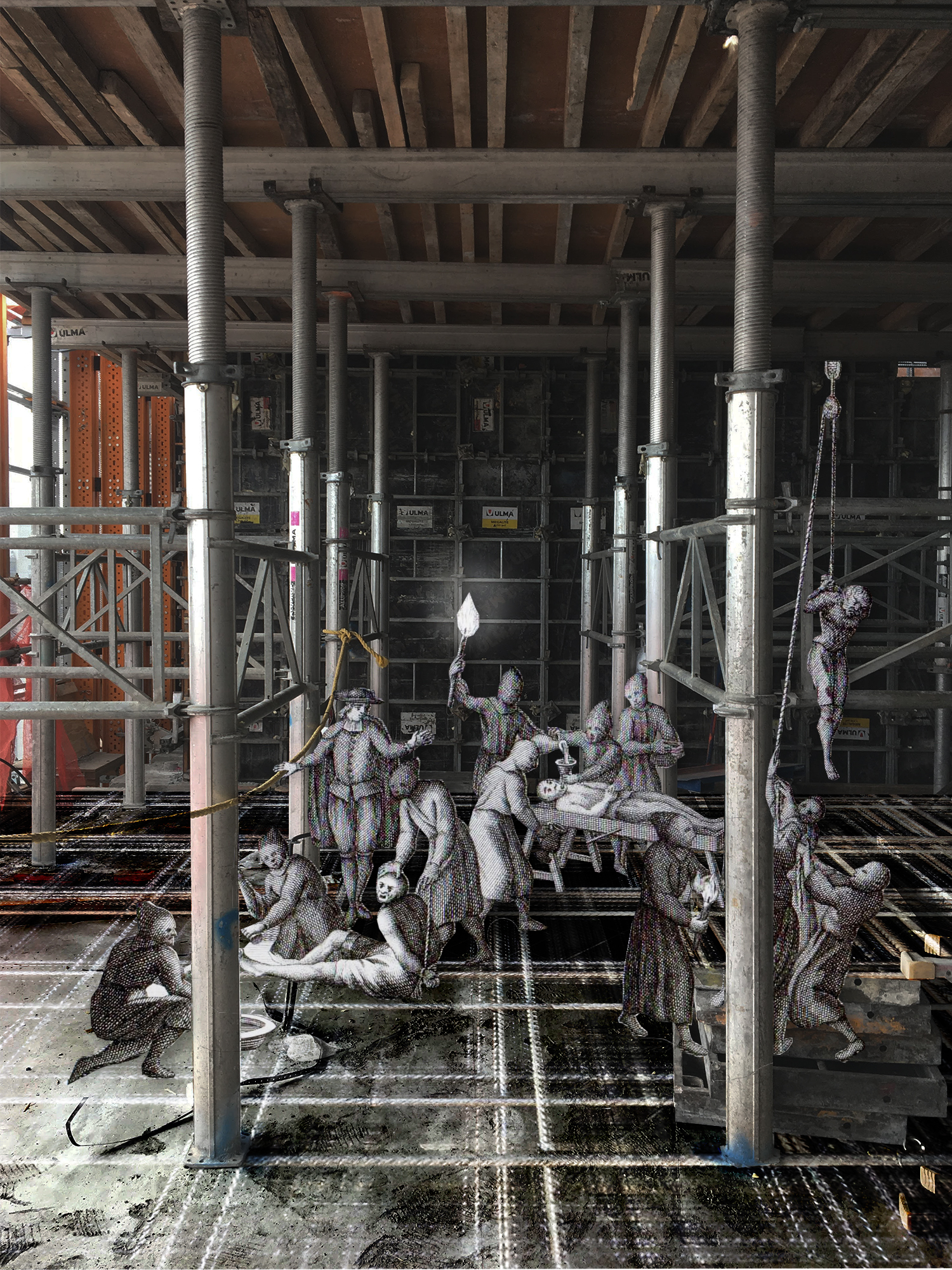
The following excerpt is from an essay I wrote in 2019-2020 entitled, "Development: An Apparatus for Humiliation." The research used critical theory, capitalist professional practices and metaphorical analysis to argue that contemporary development and construction operations are both consciously and unconsciously repressive and ideological intending to exploit and humiliate land and existing communities.
Imagine a place — hybrid machine of human construction workers suspended and strapped, melted even onto a lattice of iron bars. I've been there. The ground is nowhere in sight. Is this a cage or some sort of shelter? The place is vertiginous—a monstrous intricacy of rebar piercing upward from a cacophony of construction tools and materials.
If there were no understanding of modern building operatives, a construction site might imply a torture chamber. Michel Foucault in his 1995 book Discipline and Punish describes a horrific kind of 18th century European public theater that bears many aesthetic similarities:
"into an iron cage, suspended in the air, above a public square; [a criminal] would be completely naked; he would be attached to the bars of the cage by an iron belt around his waist; to the end of his days… Above the punitive city hangs this iron spider; and the criminal who is to be thus crucified...”
At the time, this gruesome and oppressive metallurgic scene, which at the forefront emphasizes an “iron cage,” was a lesson and not-so-subtle threat to public witnesses of their potential fate were they to step out of line. Now, such a site is the formation of a building’s foundation. To an empiricist’s mind, — one that would not leap to any theoretical assumptions — construction is not a site of human penal intent. But how ironic that in late feudal society we would use an iron cage to display and humiliate a criminal when today we would use that same iron cage to lock and hide away land in preparation for a building. Construction sites are unequivocal examples of our penalistic actions toward the environment. The scene Foucault describes visually parallels how our aggressive and anthropocentric building processes can quickly humiliate our natural planet, in the same way it would a criminal. Ripping up the earth and covering it in a cage, we are destroying its ecosystem; its complexity; its nurturence that sustains us with life-giving resources; and even our own responsive libidinal desire to care for it in return....
Works Cited
Louis Althusser, “Ideology and Ideological State Apparatuses” in Lenin and Philosophy and Other Essays. (United Kingdom, Monthly Review Press, 2001).
Brian Burkhart, Indigenizing Philosophy Through the Land: A Trickster Methodology for Decolonizing Environmental Ethics and Indigenous Futures. (United States: Michigan State University Press, 2019).
Cormac Cullinan, Wild law: A manifesto for Earth justice. (White River Junction, VT: Chelsea Green Pub, 2011).
Michael Foucault, Discipline and Punish: The Birth of the Prison. Translated by Alan Sheridan. (United States: Random House, Inc., 1995) 113-4).
Donna J. Haraway, “A Cyborg Manifesto: Science, technology, and Socialist-Feminism in the Late Twentieth Century,” in Simians, Cyborgs, and Women: The Reinvention of Nature (New York: Routledge, 1991), 149-181.
Patrick Colm Hogan, The Culture of Conformism: Understanding Social Consent. (United Kingdom: Duke University Press, 2001).
Donald Klein, “The Humiliation Dynamic: An Overview.” The Journal of Primary Prevention .12. 93-121. (1991). 10.1007/BF02015214.
John Locke, ed. Jonathan Bennett. Two Treatise of Government. Early Modern Text, https://www.earlymoderntexts.com/assets/pdfs/locke1689a.pdf. Accessed 2 April. 2019.10. Mike E. Miles, et al.
Real Estate Development: Principles and Process. (United States, Urban Land Institute, 2015).
James C. Scott. Seeing Like a State: How Certain Schemes to Improve the Human Condition Have Failed. (New Haven: Yale University Press, 1998.)
Unknown. “Etymology.” Definition of Humiliate - Merriam-Webster's Dictionary , 2007, wordcentral.com/cgi-bin/student?humiliate.
Matthew Wildcat, McDonald, M., Irlbacher-Fox, S. and Coulthard, G. “Learning from the land: Indigenous land based pedagogy and decolonization” in Decolonization: Indigeneity, Education & Society, 3(3): 2014.
Slavoj Zizek. Violence , (New York: Picador, 2008).